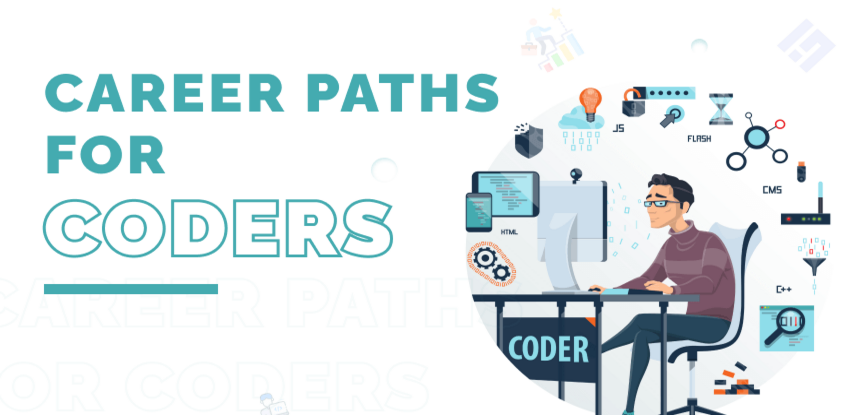31 Jan, 2024

So you want to learn how to code but don't know where to start? You've come to the right place! Getting into coding can be intimidating at first, but with the right guidance you will be building your own websites and apps sooner than you think. This comprehensive guide provides everything you need as a complete beginner to take the first steps towards becoming a confident coder.
Before we jump in, let's first discuss some of the major benefits of learning coding skills:
- High Demand Jobs - Software developer jobs are extremely high in demand with a projected 22% job growth in the next 10 years. The tech industry offers well-paying coding careers all over the world.
- Build Anything- With the power to code you can build websites, apps, programs, games - anything you want! Coding allows you to turn ideas into software solutions.
- Problem Solving - Coding teaches computational thinking and how to break down problems methodically. These universally helpful skills improve logic and make you a better solver across domains.
- Express Creativity - Code combinations are endless allowing you to constantly create new solutions. Coding lets you channel creativity through technology.
The possibilities are truly limitless when you speak code!
All code is written using some programming language. While dozens exist, the most beginner friendly options are:
- Python - General purpose language great for beginners due to its simple and readable syntax. Used for app development, data analysis, machine learning, and even for building websites.
- JavaScript - The language of the web. Allows creating interactive front-end web pages and is essential for modern web developers. Can also be used for app development.
- Ruby - An elegant open source language with a vast library of tools especially suited for rapidly building web applications. Very readable code.
I recommend starting with either Python or JavaScript as they have the most learning resources and apply more universally across domains. Focusing on just one language when you're starting out allows you to grasp core coding concepts without getting overwhelmed.
While every coding language differs in syntax, they share common foundations in how they work. Master these essential concepts first before choosing specific languages:
- Basic Syntax- Rules like semicolons, brackets, variable declarations that allow communicating with the computer
- Data Types- Ways of classifying data values like numbers, text, or booleans to manipulate them easily.
- Variables - Named containers that store data values which can be changed later on.
- Operators - Symbols representing actions that can be performed on values like arithmetic or comparison.
- Conditional Logic - Allow decisions to be made by checking conditions like using If/Else statements.
- Loops - Repeat a block of code multiple times without rewriting it. Minimize effort.
- Functions - Reusable blocks of code that accept inputs, process data and return outputs.
Don't worry if these sound intimidating now! Through practical examples and projects, these will start making sense quickly.
While theory is important, coding is a practical skill. The best way to cement concepts is by building your own projects. Start with simple command-line programs before moving to more interactive web pages and apps later.
Some beginner project ideas:
- Calculator App - Perform arithmetic operations based on user input.
- Unit Converter - Convert values like currency or distance units.
- To-do List - Create task tracker to add and remove items.
- Number Guesser - Make the computer guess a random number based on hints.
- Text-based Game - Interactive stories and game choices for decision making.
Look up specific tutorials for these project ideas in your chosen language and code along. Using online coding platforms also allows writing practice code quickly in the browser without downloading tools.
Make Mistakes!
As a coding novice you will encounter plenty of errors and bugs. From typos to logical mistakes, traces will crash and things won’t work as expected. But mistakes are integral to learning so long they are learned from! Debugging teaches you how to investigate issues.
Adopting a trial and error mindset allows overcoming the inevitable failures on your coding discovery. Perseverance through problems leads to skill.
Additional Tips
Here are some bonus hacks to boost your coding journey as a beginner:
- Code Daily - Practice regularly even if for 30 mins to reinforce concepts. Coding is a practical discipline requiring constant application to sink in.
- Take Notes - Jot down concepts, syntax and commands you learn for easy reference later. Review them to retain knowledge.
- Learn Git - This version control tool helps manage and track code changes. Highly useful skill alongside coding.
- Be Patient - Coding takes time and persistence to master. Stick with the process focusing on gradual improvements.
- Join Forums - Developer communities provide the best avenues for discussions and finding solutions whenever stuck.
Most importantly - Have fun! Coding can be deeply satisfying so enjoy the process of bringing ideas to life.
Moving Forward
This guide should provide a structured approach helping beginners foray into coding. Start with the fundamentals before choosing a language to build small projects for cementing your skills. Identify resources that best suit your learning style.
While the road ahead takes effort, patience and grit, the rewards of coding skills are immense both professionally and personally. Not only are careers transformed but problem solving abilities greatly amplify.
Soon you’ll transition from coding newbie to building real-world programs! By being an active learner fueled by consistent practice, exciting doors lie ahead.
Ready to start writing your coding story? The path begins here with Best IT training Institute In Surat - 100% Job Assistance